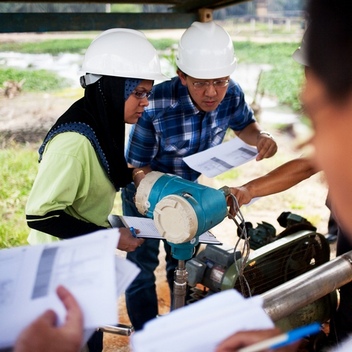Regional Collaboration Centre opens in Bangkok, Thailand
 UNFCCC Establishes Regional Collaboration Centre for Asia-Pacific Region
UNFCCC Establishes Regional Collaboration Centre for Asia-Pacific Region
Centre in Partnership with the Institute for Global Environmental Strategies to Help Speed up Spread of Clean Technology
(Bonn, 27 August 2015) – Clean technology in developing countries has received a further boost with the establishment of a centre to promote the Clean Development Mechanism (CDM) in the Asia-Pacific Region.
Welcoming the establishment of the centre in Bangkok, Thailand, just months before the UN Climate Change Conference in Paris, Christiana Figueres, Executive Secretary of the United Nations Framework Convention on Climate Change (UNFCCC) said: “By providing a hub for CDM project opportunities in the Asia-Pacific region, the new Regional Collaboration Centre in Bangkok is a further step towards a truly global climate change response and serves as another example of successful international cooperation.”
The Centre will be operated in partnership with the Institute for Global Environmental Strategies (IGES) and will support all countries in the region in identifying and designing CDM projects and offering opportunities to reduce transaction costs. It will work in collaboration with the other Regional Collaboration Centres (RCCs) in Africa, Latin America and the Caribbean.
Professor Hironori Hamanaka, Chair of the Board of Directors of IGES, praised the inter-agency cooperation as an important step towards attaining the goals set by the international community to combat climate change. He said: “We are honored to work in partnership with the UNFCCC in Asia and the Pacific, and this Regional Collaboration Centre in Bangkok will further tap the potential for CDM projects in the region.”
The CDM allows emission reduction projects in developing countries to earn certified emission reductions (CERs), each equivalent to one tonne of CO2. CERs can be traded and sold, and used by industrialized countries to meet a part of their emission reduction targets under the Kyoto Protocol.
This is the fifth CDM RCC established by the UNFCCC in partnership with a regional organization. The first centre was established in January 2013 in Lomé, Togo to increase participation in CDM projects in West and Francophone Africa. A second centre was established in Kampala, Uganda to serve the rest of Africa. A third was established in Saint George’s, Grenada to assist in the development of CDM projects in the Caribbean, and a fourth was set up in Bogotá, Colombia to support underrepresented countries in Latin America.
The Asia-Pacific RCC will be hosted in the IGES offices in Bangkok and will become operational on 1 September 2015.
For further information please contact:
David Abbass, Public Information Officer, UNFCCC at: CDM-Press@unfccc.int,+49 (0) 228-815-1511
Augustine Kwan, Programme Manager, IGES at: iges_pr@iges.or.jp, +66-2-651-8797
About the CDM
The clean development mechanism (CDM) allows emission reduction projects in developing countries to earn certified emission reductions (CERs), each equivalent to one tonne of CO2. CERs can be traded and sold, and used by industrialized countries to meet a part of their emission reduction targets under the Kyoto Protocol. With more than 7.600 registered projects in more than 100 countries, the CDM has proven to be a powerful mechanism to deliver finance for emission-reduction projects and contribute to sustainable development.
About the UNFCCC
With 196 Parties, the United Nations Framework Convention on Climate Change (UNFCCC) has near universal membership and is the parent treaty of the 1997 Kyoto Protocol. The Kyoto Protocol has been ratified by 192 of the UNFCCC Parties. For the first commitment period of the Kyoto Protocol, 37 States, consisting of highly industrialized countries and countries undergoing the process of transition to a market economy, have legally binding emission limitation and reduction commitments. The ultimate objective of both treaties is to stabilize greenhouse gas concentrations in the atmosphere at a level that will prevent dangerous human interference with the climate system.
About IGES
IGES is a non-profit, research institute headquartered in Hayama, Japan with offices in Kansai, Kitakyushu and Tokyo, as well as in Bangkok, Thailand and Beijing, China. Information on IGES research, networks and events are available on the IGES website: http://www.iges.or.jp/en/
See also: <http://cdm.unfccc.int >
Twitter: @UN_ClimateTalks, @UN_CarbonMechs
Facebook: facebook.com/UNclimatechange, facebook.com/ UNcarbonmechs
UNFCCC Executive Secretary Christiana Figueres on Twitter: @CFigueres
Photo by: Andreas Wallin Karlsen
CDM PROJECT - 4491: Wastewater Treatment with Biogas System in Palm Oil Mill at Saikhueng, Surat Thani, Thailand

Offset now: visit the United Nations Carbon Offset Platform
Connect with us: